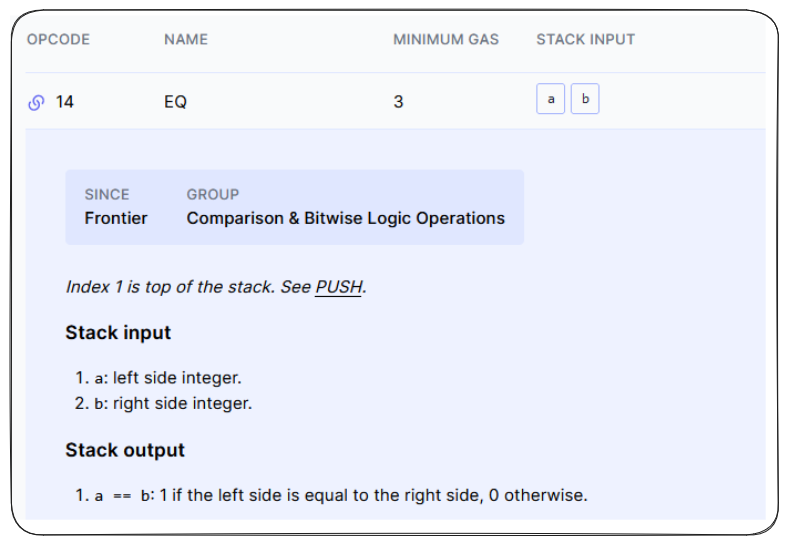5/5
_Follow along with this video:_ --- In this lesson we're going to take the next step in routing our `calldata` to the appropriate function! Previously we'd isolated our function selector and we'd said: ``` If f_select == updateHorseNumber -> jump to that data in the contract If f_select == readNumberOfHorses -> jump to that data in the contract ``` Let's look at how we perform these comparisons in Huff. Our function selectors for these functions are as follows: ``` updateHorseNumber = 0xcdfead2e readNumberOfHorses = 0xe026c017 ``` These selectors can be determines by running `cast sig "updateHorseNumber(uint256)"` and `cast sig readNumberOfHorses()` respectfully. Once we have these signatures, there's an opcode we can use to check equality, the `EQ` opcode! Let's review how it works in [**evm.codes**](https://www.evm.codes/?fork=shanghai)  As we can see, the `EQ` opcode takes the top item on our stack and compares it to the next item in the stack. This opcode will return `1` if the values compared are equal and `0` if they are not equal. Let's remind ourselves of our current contract state: ```js #define macro MAIN() = takes(0) returns(0){ 0x00 calldataload 0xe0 shr // [function_selector] } ``` Our stack currently has the isolated `function selector` from our received `calldata` on it, so to perform our comparison we'll need to `PUSH` our function selector to the stack and then execute the `EQ` operation! Our contract (and stack) are going to look this like as a result: ```js #define macro MAIN() = takes(0) returns(0){ 0x00 calldataload 0xe0 shr // [function_selector] 0xcdfead2e // [0xcdfead2e, function_selector] eq // [true_if_func_selector_matches] } ``` Let's next take a look at how to handle when a match is found!
Follow along with this video:
In this lesson we're going to take the next step in routing our calldata to the appropriate function! Previously we'd isolated our function selector and we'd said:
Let's look at how we perform these comparisons in Huff. Our function selectors for these functions are as follows:
These selectors can be determines by running cast sig "updateHorseNumber(uint256)" and cast sig readNumberOfHorses() respectfully. Once we have these signatures, there's an opcode we can use to check equality, the EQ opcode! Let's review how it works in evm.codes

As we can see, the EQ opcode takes the top item on our stack and compares it to the next item in the stack. This opcode will return 1 if the values compared are equal and 0 if they are not equal.
Let's remind ourselves of our current contract state:
Our stack currently has the isolated function selector from our received calldata on it, so to perform our comparison we'll need to PUSH our function selector to the stack and then execute the EQ operation! Our contract (and stack) are going to look this like as a result:
Let's next take a look at how to handle when a match is found!
Opcode EQ
A comprehensive guide to function selectors in Solidity smart contracts - This lesson covers how to compute a function selector in Solidity, how to check for function selector matches in assembly, and how to use the 'EQ' opcode to check for equality between the top two items on the stack.
Previous lesson
Previous
Next lesson
Next
Course Overview
About the course
What you'll learn
Assembly
Writing smart contracts using Huff and Yul
Ethereum Virtual Machine OPCodes
Formal verification testing
Smart contract invariant testing
Halmos, Certora, Kontrol
Course Description
Who is this course for?
- Smart contract security researchers
- Advanced Smart contract engineers
- Chief Security Officiers
- Security professionals
Potential Careers
Security researcher
$49,999 - $120,000 (avg. salary)
Smart Contract Auditor
$100,000 - $200,000 (avg. salary)
Meet your instructors
Guest lecturers:
Last updated on August 11, 2025
Duration: 30min
Duration: 4h 39min
Duration: 3h 58min
Duration: 1h 56min
Course Overview
About the course
What you'll learn
Assembly
Writing smart contracts using Huff and Yul
Ethereum Virtual Machine OPCodes
Formal verification testing
Smart contract invariant testing
Halmos, Certora, Kontrol
Course Description
Who is this course for?
- Smart contract security researchers
- Advanced Smart contract engineers
- Chief Security Officiers
- Security professionals
Potential Careers
Security researcher
$49,999 - $120,000 (avg. salary)
Smart Contract Auditor
$100,000 - $200,000 (avg. salary)
Meet your instructors
Guest lecturers:
Last updated on August 11, 2025
